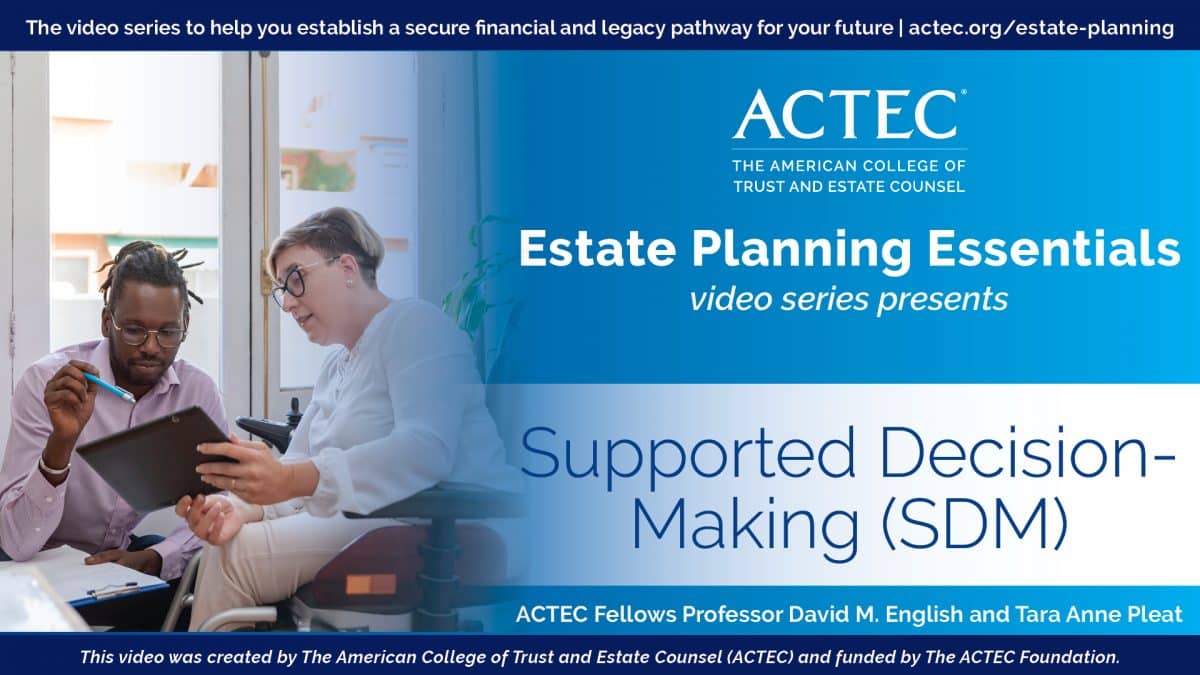A special needs trust, also known as a supplemental needs trust, is a type of irrevocable trust that can provide benefits to minors and physically or mentally challenged individuals.
ACTEC Fellows Stacy E. Singer and Peter S. Stern discuss the different types of special needs trusts, what to consider to avoid losing pubic benefits like Medicaid, and other potential pitfalls.
Transcript
Hi, I’m Stacy Singer. I am an ACTEC Fellow from Chicago, Illinois. And I’m Peter Stern. I am an ACTEC Fellow from Palo Alto, California. Peter and I are here today to talk about special needs trusts. So, Peter, let’s start with, what is a special needs trust?
A special needs trust is an estate planning vehicle that people can use to provide for special and supplemental needs for disabled children or grandchildren.
Okay, so why would someone use a special needs trust instead of some other kind of trust?
Well, you know, in the old days parents would come to me as an estate planner – they’d ask me: what to do about my disabled child? I don’t want to leave any money to her because it’ll be wasted, and I said, “Well no, that’s not the right approach. We have something we can put in your estate plan – a special needs trust – with someone to manage the money for your disabled child so your disabled child can keep her public benefits and have somebody competent manage your money.”
Okay. So are there different kinds of special needs trusts or is there just one form of it?
Well, there are essentially two categories of trusts. One would be the kind I was describing right then, that a parent or grandparent would set up. It would be part of the estate plan. The parents would leave money to the their children, but this way, the money for the disabled child goes into the special needs trust. Also, there is another kind called a first-party trust. This would be a special needs trust set up by the disabled person himself or herself, or by a parent for the person, but it would hold the disabled child’s money. Perhaps a windfall, an inheritance, or a personal injury settlement.
Okay, so couldn’t you just leave the money directly to the disabled person? I mean, this seems awfully complicated.
Well, you could but of course, that’s the problem. If you do leave the money to the disabled child and the disabled child is on public benefits, many of these benefits are means-tested. That means the government looks at what kind of income or assets that person has. So if you leave a large sum of money to a disabled child, the child might lose Medicaid or some other public benefits. Also, lots of people aren’t really able to manage money. They don’t have to be disabled, by the way. Very, you know, ordinary people can’t manage money, but for the disabled child the management can be taken over by a trustee to make sure it’s managed properly.
Okay, so what are some of the issues that a parent or a grandparent would need to consider when they’re creating one of these trusts?
Well, the first consideration, how much should we put in? What are the needs of the disabled child, and that requires a bit of work to figure out. Also, who we select as a trustee and how we deal with the government going forward if there are public benefits involved.
So, you mentioned choosing a trustee. So how do you decide who should act as a trustee?
It’s a very good question. Parents often want to name the brother or the sister to be in charge for the child, but you know, first of all, that person might want to have a more normal relationship with this disabled sibling. Also, it’s wearing. It really wears a person out to do this, and often it’s a good idea to go for a professional. If there’s a large sum of money, perhaps a corporate trustee or a professional fiduciary to manage the money.
Okay, so are there any pitfalls or risks that someone should consider when they’re setting up one of these trusts?
Oh, there are indeed. For one thing, you have to be careful about not disqualifying the person for public benefits by giving too much money, making money available directly to the child. Also, you have to give good instructions to the trustee to be able to follow what the needs of the child are, and often that’s not done in these trusts. Those are the major considerations we have, and the problems.
Well, Peter, this has been incredibly helpful, and I think very valuable. Thank you so much.
Well, you’re welcome. I was happy to do it.
Featured Video
Supported Decision-Making
Experts on supported decision-making explain how this alternative to guardianship for individuals with disabilities works and answer questions families may have
ACTEC Estate Planning Essentials

ACTEC Fellows provide answers to frequently asked trust and estate planning questions in this video series.



